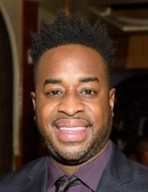Below is an edited version of Appendix 7-Contributing Composers’ Brief Biographies from So You Want to Sing Spirituals .
“My compositional process involved hours of engaging the texts and reflecting on the honest lyrics that are often multidimensional and complex, yet simply expressed, humbly, in slave vernacular. The messages are discerning and personal. They evoke the hard truths of slavery in such a meaningful and even beautiful way: the inhumanity, the tragedy, and the scars, which still in many ways remain unhealed on the back of America. Yet somehow, despite hard truths and devastating context, the most compelling features of these songs may be the elements of hope that are ubiquitous throughout their texts.”1
Composers’ Brief Biographies
In addition to the pioneers of concert spirituals mentioned in Chapter Three of So You Want to Sing Spirituals, a number of composers have contributed to this vocal music repertoire. Below are biographical sketches of some of those composers and a sample listing of recordings of their concert spirituals.
Composers listed below are:
Links to extended biographies on the Afrocentric Voices in “Classical” Music site are added.
Late Nineteenth Century
These composers were born in the generation immediately following the end of the American Civil War in 1865. They were often the children of ex-slaves or they otherwise were exposed to the Negro spiritual directly from the living sources of these songs. They continued the process, begun by the Fisk Jubilee Singers, of sharing this soul-stirring, original American music across the United States and around the world.
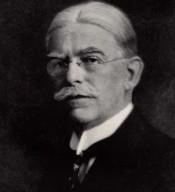 William Arms Fisher
William Arms Fisher
(b. 27 April 1861, San Francisco, California; d. 18 December 1948, Brookline, Massachusetts)
After rejecting a career in business, Fisher studied with composer Antonin Dvořák at the National Conservatory of Music. He edited the song collection, Sixty Irish Songs (1915) and wrote Notes on Music in Old Boston (1918), which was expanded 15 years later into One Hundred and Fifty Years of Music Publishing in the United States. Fisher has also been credited for using the Largo movement of Dvořák’s Symphony from the New World to write the words and music of the song, “Goin’ Home” (1922).
Fisher’s Seventy Negro Spirituals was published by Oliver Ditson in 1926). Contralto Madeleine Martinetti recorded Fisher’s version of “Deep River” in the early 1900s, as well as a 1917 recording of the song by soprano Frances Alda, with a later recording of the same song by soprano Eileen Farrell. The collection is out-of-print, and no contemporary recordings apparently include the performance of Fisher’s settings.
Audio Recordings Include: Frances Alda. “Deep River.” Victrola 64687, streaming audio.
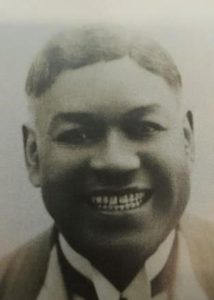
John C. Payne
(b. 26 June 1872, Montgomery, Alabama; d. Cornwall, England, 7 October 1952)
A composer whose full name has variously been listed as either John Clarence Payne or John Charles Payne, Payne began his musical career performing with various professional quartets. The baritone, composer, choral director, and actor emigrated to England, where his home quickly became “the place to be” for African American musicians–including Marian Anderson, Paul Robeson, Ethel Waters, and Alberta Hunter–who had come to Europe to establish professional careers.
In the 1920s, Payne recorded his own settings of Negro Spirituals, along with those by H. T. Burleigh, with pianist Lawrence Brown. He set five of those songs, Negro Spirituals Arranged by John Payne: For Low Voice, that was published by G. Schirmer in 1942.
John C. Payne Extended Biography
Audio Recordings Include: Payne, John C. Brother, Can You Spare a Dime?: The Roots of American Song. Pearl Gemm CD 9484, 1991, compact disc.
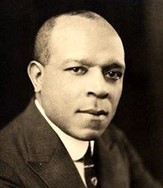 John Rosamond Johnson
John Rosamond Johnson
(b. Jacksonville, Florida, 11 August 1873; d. New York, New York, 11 November 1954)
Composer, singer, educator, and conductor John Rosamond Johnson studied voice and piano at the New England Conservatory. He partnered with his brother, James Weldon Johnson, to become successful writers and performers in vaudeville and musical theater. The pair also collaborated on the creation of the anthem, “Lift Every Voice and Sing,” and on two of J. Rosamond Johnson’s African American music anthologies.
Audio Recordings Include: Marian Anderson. Farewell Recital. RCA Victor LSC 2781, 1964, long–playing disc; Duncan, Todd. Negro Spirituals. Allegro ALG3022, 1952?, long-playing disc.
 Hugo Frey
Hugo Frey
(b. 26 August 1873, Chicago, Illinois; d. 13 February 1952, New York, New York)
Hugo Frey studied music at the Chicago Conservatory. He was a professional violist and pianist as well as a dance orchestra conductor and music arranger for the stage, sound recordings, and film. He also edited simplified versions of popular music of the era and was a charter member of ASCAP. Like numerous composers of the time, Frey drew upon Negro spirituals to write several songs for voice and piano. His A Collection of 25 Selected Famous Negro Spirituals was published by Robbins-Engel in 1924.
Audio Recordings Include: Odekhiren Amaize. For Darfur! Irin Ajo and Other Sacred Songs and Spirituals. MSR Classics MS 1296, 2008, compact disc.
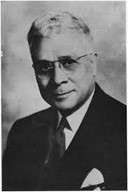 Clarence Cameron White
Clarence Cameron White
(b. 10 August 1880, Clarksville, Tennessee; d. 30 June 1960, New York, New York)
White was a violinist, composer, and educator who began his violin studies at the age of 8–including coaching with violinist Will Marion Cook. He continued his musical study at Oberlin Conservatory and in London with teachers such as composer Samuel Coleridge-Taylor. White composed for both vocal and instrumental forces continued to perform as a violinist and served on the faculties at West Virginia State College and Hampton Institute. He was also a charter member of the National Association of Negro Musicians. White’s collection of spirituals, Forty Negro Spirituals: Compiled and Arranged for Solo Voice, was published in 1927. In the preface of the collection, the composer suggested that “… the Negro dialect, as sung, should not be an exaggeration of the written form of the words, whose spelling is only an approximation to the actual sound in genuine Negro dialect; and the element of syncopation shall not lose its nature as a secondary offshoot of the rhythm of words and syllables, and be mispresented as mere musical surprise.”
Audio Recordings Include: Jules Bledsoe. The Concerto: African American Spirituals. Orange Amaro, 2019, streaming audio.
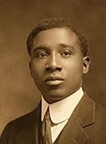
Robert Nathaniel Dett
(b. Drummondsville, Ontario, Canada, 11 October 1882; d. Battle Creek, Michigan, 2 October 1943)
R. Nathaniel Dett attended Oberlin College Conservatory, becoming the first person of African descent to receive a bachelor’s degree there, and he studied at several other American and European prestigious schools before earning his Master of Music from Eastman School of Music. He began touring as a concert pianist and publishing music. He taught at Lane College in Tennessee, Lincoln Institute in Missouri, Hampton Institute in Virginia and Bennett College in North Carolina. His piano and choral music during those years were written to suit his teaching needs. His Negro Spirituals: with Settings for Solo Voice was published by J. Church in 1919. A choral director and educator, Dett also composed approximately 100 works for piano, chorus, and solo voice. He wrote six Negro spirituals, including “I’m Goin’ to Thank God” and “Ride On, Jesus,” especially for soprano Dorothy Maynor.
Robert N. Dett Extended Biography
Audio Recordings Include: Maynor, Dorothy. Dorothy Maynor in Concert at Library of Congress. Library of Congress, Music Division LCM 2141, 2007, compact disc; Moses, Oral. Amen! African-American Composers of the 20th Century. Albany Records TROY459, 2001, compact disc.
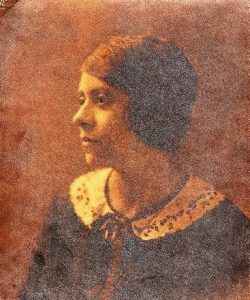 Florence Beatrice Smith Price
Florence Beatrice Smith Price
(b. 9 April 1888, Little Rock, Arkansas; d. 3 June 1953, Chicago, Illinois)
Music was an important part of Price’s life from an early age, as evidenced by her public performance at the age of four. She was a teacher and composer, especially of works for the piano. In 1933, Price became the first African-American female composer whose work was performed by a major American symphony orchestra when The Chicago Symphony Orchestra performed her Symphony in E Minor. As with many of her compositions, Price drew upon her exposure to Negro folk music in composing her vocal music. Her best known Negro spiritual is undoubtedly “My Soul Been Anchored in the Lord,” which is published—along with songs by Betty Jackson King, Undine Smith Moore, Julia Perry and Margaret Bonds—in Art Songs and spirituals by African-American Women Composers, edited by Vivian Taylor and published by Hildegard Publishing in 1995. The song was also included in the anthology, 44 Art Songs and Spirituals, compiled by Richard Heard and published by Clarnan Edition in 2015.
Florence Price extended biography
Audio Recordings Include: Angela Brown. Mosiac: A Collection of African-American Spirituals with Piano and Guitar. Albany Records TROY721, 2004, compact disc; Richard Heard. My Dream: Art Songs and Spirituals. Percentage Records, 2012, compact disc; Louise Toppin and Jay A. Pierson. Ah! Love But a Day: Songs and Spirituals by Women Composers. Albany Records TROY 385, 2000, compact disc; Various performers. Watch and Pray: Spirituals and Art Songs by African-American Women Composers. Koch International Classics 3-7247-2H1, 1994, compact disc.
Late 19th Century to World War I
These composers, born from the last decade of the 19th Century to the 1920s, were witnesses to or impacted by the effects of Jim Crow Laws, the Great War, the Harlem Renaissance, and World War II. Their compositional treatments of the Negro spiritual not only reflected Neo-Romanticism but the influences of the popular music, such as Jazz and Blues, of the era.
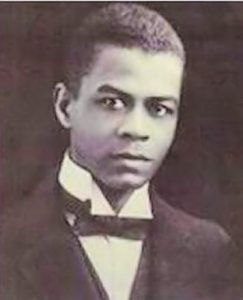 Lawrence Benjamin Brown
Lawrence Benjamin Brown
(b. 28 August 1893; d. 25 December 1972, New York, New York)
Lawrence Brown began studying piano as a youth and quickly demonstrated a gift for playing the instrument. He continued his studies first in Boston, then to London, where he attended Trinity College and developed skills as both a pianist and composer. He became accompanist for tenor Roland Hayes, joining him for a command performance for the king of England in 1921. Brown returned to the United State in 1925 in order to further develop his knowledge of Negro Spirituals, which led to composing several concert settings for solo voice and piano. Baritone Paul Robeson introduced Brown’s songs in what is believed to be the first all spirituals recital in 1925. Brown toured internationally and recorded with Robeson in a collaboration that lasted until the early 1960s.
Lawrence Brown Extended Biography
Several of Brown’s spirituals were published in The Books of American Negro Spirituals.” He published three collections, Spirituals: Five Negro Songs (1923) and Negro Folk Songs (1930), with Schott, plus the Six Negro Folk Songs was published by Associated Music in 1943. He also edited spirituals composed by Burleigh specifically for performance by Robeson. In addition to a multitude of recordings of Brown’s spirituals by Robeson and Brown, contralto Marian Anderson and tenor Roland Hayes were two of the singers who recorded their interpretations of Brown’s concert spirituals.
Audio Recordings Include: Paul Robeson. The Complete EMI Sessions, 1928-1939. EMI Classics 50999 2 15586 2 7, 2008, compact discs.
 Eva Alberta Jessye
Eva Alberta Jessye
(b. 20 January 1895, Coffeyville, Kansas; d. 21 February 1992, Ann Arbor, Michigan)
Born to ex-slaves, Eva Jessye was best known as founder and director of the Eva Jessye Choir, which gained international recognition for its work on radio, in films and on Broadway, including performing in Virgil Thomson’s opera, Four Saints in Three Acts. She was the music director for the original cast of George Gershwin’s Porgy and Bess. An educator, singer, poet, and actress, Jessye also composed works for chorus and solo voice.
Jessye published My Spirituals for solo voice in 1927. She prefaced each of the 16 songs in the collection with stories and poems about family and community members who sang those folk songs in worship or during everyday or special life events. In the preface of her collection, Jessye explained her approach to selecting the songs:
Those who are unfamiliar with the Negro citizenry of Southern Kansas may question the authenticity of Spirituals gathered from so Northern a source. On second thought they will realize that Kansas, and especially the Southern section, was the nearest refuge of the runaway slave. It was the state which reached out protecting hand to the fugitives and escorted them via the “underground railroad” to a land of freedom and brotherhood.2
Audio Recordings Include: Benjamin Matthews. A Balm in Gilead. Ebony Classic Recordings ECR 0001, 2000, compact disc.

William Grant Still
(b. 11 May 1895, Woodville, Mississippi; d. 3 December 1978, Los Angeles, California)
Known as the “Dean of Black Music,” William Grant Still studied at Wilberforce University and Oberlin College, and he received a Guggenheim Fellowship. His Afro-American Symphony was the first by an African American composer to be performed by a major orchestra. While he wrote for the operatic stage and for television, as well as vocal and instrumental works for the concert stage, he set few spirituals for solo vocal concert performance. He preferred, instead, to use blues elements for his inspiration. However, he did compose and publish Twelve Negro Spirituals (Handy Bros. Music, 1937) for voice and piano.
Audio Recordings Include: Various performers. More Still: Music by William Grant Still. Cambria CD1112, 1999, compact disc; Videmus. Works. New World Records 80399-2, 1990, compact disc.
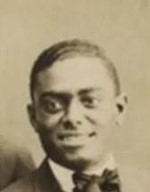 William Lawrence
William Lawrence
(b. Charleston, South Carolina, 20 September 1895; d. 17 March 1981, New York, New York)
Lawrence studied music at Avery Normal Institute, Charleston, the New England Conservatory, Boston, Boston University, as well as in Paris. He toured extensively, both as accompanist for tenor Roland Hayes and as part of the Hayes Trio. His setting of the communion hymn, “Let Us Break Bread Together,” was published in 1945 and has become a spirituals standard over the years.
Audio Recordings Include: Leontyne Price and Marian Anderson. The Best of Negro Spirituals. BMG Funhouse BVCM-37416, 2003, compact disc.
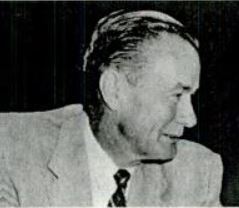 Robert MacGimsey
Robert MacGimsey
(b. Pineville, Louisiana, 7 September 1898; d. 13 March 1979, Phoenix, Arizona)
Robert MacGimsey received his musical training at Juilliard. After a brief career as a lawyer, he became a professional whistler, performing on the radio and in recordings. He also pursued a career as a singer and composer. His original songs reflected his southern roots, especially the Negro folksongs he heard and transcribed. His “Sweet Little Jesus Boy” (Carl Fischer, 1934), which has become a Christmas staple for vocalists, and “Shadrack” (Carl Fischer, 1937) are two of the songs he wrote in the style of a spiritual.
Audio Recordings Include: Robert Merrill. Robert Merrill. Lebendige Vergangenheit MONO 89501, 1999, compact disc; Jessye Norman. Amazing Grace. Philips 432-546-2, 1990, compact disc.
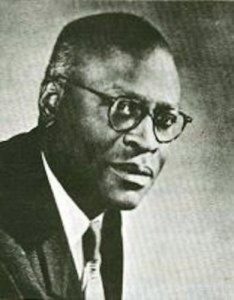 Edward Hammond Boatner
Edward Hammond Boatner
(b. 13 November 1898, New Orleans, Louisiana; d. New York, New York, 16 June 1981)
Known as a successful singer, composer, and educator, Boatner was also an instructor at his own academy, the Edward Boatner Studio. Boatner’s best-known spirituals, “Oh, What A Beautiful City,” “City Called Heaven,” and “On My Journey” were three of over 200 spirituals he set for solo voice and piano.
Edward Boatner Extended Biography
Audio Recordings Include: Barbara Smith Conrad. Spirituals. Naxos 8.553036, 1995, compact disc; Robert Honeysucker and Marion Dry. Let’s Have a Union. Brave Records, 2009, compact disc.
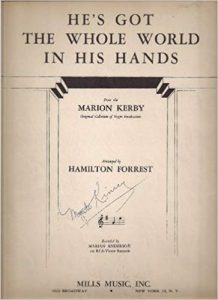 Hamilton Forrest
Hamilton Forrest
(b. 8 January 1901, Chicago, Illinois; d. 26 December 1963, London, England)
Hamilton Forrest completed his bachelor’s and master’s musical studies at the American Conservatory of Music, Chicago. During his extensive travels, he researched and collected folk music in Kentucky before establishing himself in England.
Forrest’s setting of “He’s Got the Whole World in His Hand” was published in 1951. He dedicated the spiritual to contralto Marian Anderson, who regularly programmed the song in her recitals. Anderson was noted as stating that Forrest “provided a piano part that fits the words like a glove.”
Audio Recordings Include: Anderson, Marian. Spirituals. RCA Victor Red Seal 09026-63306-2, 1999, compact disc.
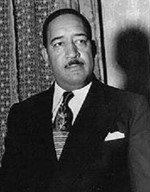
John Wesley Work III
(b. 15 July 1901, Tullahoma, Tennessee; d. 17 May 1967, Nashville, Tennessee)
Work was born into a musical family, where his mother was a trained singer, his father was a music professor at Fisk, and his paternal grandfather was a church choral director who had worked with some of the original members of the Fisk Jubilee Singers. Unsurprisingly, his musical studies started at an early age, leading to undergraduate study at Fisk, additional study at the Institute of Musical Art (later renamed Julliard), a master’s degree from Columbia, a second bachelor’s from Yale, and an honorary doctorate from Fisk. In addition to his music teaching and administrative duties at Fisk, he extensively wrote scholarly articles and participated in a major field study of Mississippi Delta folk songs for the Library of Congress. As a composer, Work wrote for a variety of solo and ensemble forces, but he focused on choral and solo vocal music.
Audio Recordings Include: Leontyne Price. Great Moments at Carnegie Hall. RCA Red Seal 88985304202, 2016, compact disc; Kevin Maynor. Songs of America from Another American. Guild GMCD 7247, 2002, compact disc.
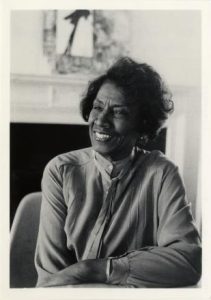
Undine Smith Moore
(b. Jarrett, Virginia, 25 August 1904; d. Petersburg, Virginia, 6 February 1989)
Undine Smith Moore, the granddaughter of former slaves, began studying piano as a child. She completed her undergraduate studies at Fisk and received her master’s degree from Columbia University Teachers College, with additional study at Julliard, Manhattan School of Music and Eastman. She taught first in the Goldsboro, North Carolina, public school system and a 45-year tenure at Virginia State College. She shared her interest in the music of Black America through workshops and lectures across the United States. While Smith Moore primarily composed choral works, including the Pulitzer Prize-nominated Scenes from the Life of a Martyr, she also wrote a number of chamber and orchestral works, as well as solo works for voice and for various solo instruments. Several of her concert spirituals were published in two collections, The New Negro Spiritual—compiled by Willis Patterson in 2002—and Art Songs and Spirituals by African-American Women Composers—published by Hildegard Publishing in 1995. The collections either included or inspired compact disc recordings of the represented works.
Audio Recordings Include: Louise Toppin. The New Negro Spiritual. W. C. Patterson, 2002, score with compact disc.
 Margaret Bonds
Margaret Bonds
(b. 3 March 1913, Chicago, Illinois; d. 26 April 1972, Los Angeles, California)
Bonds received her bachelor’s and master’s degrees in music from Northwestern University, with additional study at the Juilliard School. The pianist was the first African American to perform with the Chicago Symphony Orchestra. An educator and composer, Bonds wrote works for the theater, ballet, orchestra, and piano, but the majority were art and popular songs. Her best-known song is the setting of the spiritual, “He’s Got the Whole World in His Hand”, commissioned by Leontyne Price in 1963. It is included in a collection of her concert spirituals, In His Hand: Seven Spirituals Arranged by Margaret Bonds, which was published in 2010.
Margaret Bonds Extended Biography
Audio Recordings Include: Videmus. Watch and Pray: Spirituals and Art Songs by African-American Women Composers. Koch International Classics, 1994, compact disc.
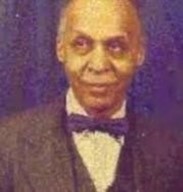 Thomas Henderson Kerr, Jr.
Thomas Henderson Kerr, Jr.
(b. Baltimore, Maryland, 3 January 1915; d. Washington, DC, 26 August 1988)
Thomas Kerr attended the Eastman School of Music of the University of Rochester, New York, where he received the Bachelor of Music degree. He joined the faculty at Howard University, Washington, DC, in 1943 and served for 35 years as a piano and composition instructor and organist. He also toured extensively as a concert pianist. Kerr composed primarily for the organ; however, he also wrote piano, choral, and solo vocal works, including concert spirituals.
Audio Recordings Include: Jessye Norman. Spirituals. Philips 416 462-2, 1990, compact disc; Darryl Taylor. How Sweet the Sound. Albany TROY1244, 2011, compact disc.
Post-World War I through World War II
These composers grew up during the Great Depression and a second world conflict, and they reached maturity during the heights of the Civil Rights Movement. They expanded the stylistic limitations of concert spirituals as their compositional approaches were further influenced by popular music of the era.
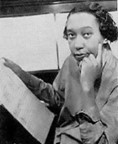 Julia Amanda Perry
Julia Amanda Perry
(b. 25 March 1924, Lexington, Kentucky; d., Akron, Ohio, 24 April 1979)
Born into a musical family, Julia Perry moved to Akron, where she studied music in the public school and then at Akron University, Westminister Choir College. She continued her studies at Julliard, Berkshire Music Center, and composition and orchestral conducting in Europe. Perry taught at Florida Agricultural and Mechanical University and at Atlanta University. Perry twice earned the Guggenheim Fellowship; she was also the recipient of a Boulanger Grand Prix and an award from the National Institute of Arts and Letters.
She gained international acclaim for her Stabat Mater for contralto and string orchestra. Her compositions included over 50 works for a variety of solo instruments and large and small ensembles, as well as solo vocal and choral works.
Audio Recordings Include: Shirley Verrett. Shirley Verrett Recital. Suiza OSCD 223, 1991, compact disc. Videmus. Watch and Pray: Spirituals and Art Songs by African-American Women Composers. Koch International Classics 3-7247-2H1, 1994, compact disc.
Robert Lee Owens
(b. 4 February 1925, Dennison, Texas; d. 5 January 2017, Munich, Germany)
Robert Owens began his musical training at an early age, first in piano and, by high school, music theory and composition. As a pianist, educator, and composer, he became acquainted with poet Langston Hughes, who became one of several 19th- and 20th-century poets whose texts Owens used in his compositions. He emigrated to Germany, where he sought professional musical opportunities he believed he would not find in the United States. Over his career, Owens used his exposure to Western European and American stylistic practices to create his own distinctive compositional approach. Owens published the song cycle, Six Negro Spirituals for Bass (Baritone) and Piano, in 2005.
Robert Owens Extended Biography
Audio Recordings Include: Oral Moses. Come Down Angels and Trouble the Water: Negro Spirituals, an American National Treasure! Albany Records TROY 1489, 2014, compact disc; Darryl Taylor. Fields of Wonder. Albany TROY897, 2006, compact disc.
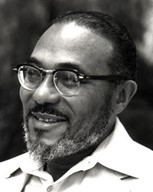
Hale Smith
(b. Cleveland, Ohio, 29 June 1925; d. Freeport, New York, 24 November 2009)
His professional career included serving as an editor and music consultant for various music publishing houses and teaching at Long Island University and the University of Connecticut, Storrs. He has composed numerous orchestral and chamber works, as well as several choral and solo vocal pieces. His settings of “Jesus, Lay Your Head in the Window” and “This Little Light of Mine” were written in 1986 and published by his Halsco publishing company.
Audio Recordings Include: Nicole Heaston. Marilyn Horne Foundation Presents on Wings of Song: Recital No. 9. Marilyn Horne Foundation DCD 5028, 2001, compact disc; George Shirley. George Shirley at 80: My Time Has Come! Videmus Records, 2014, compact disc.
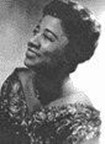 Betty Lou Jackson King
Betty Lou Jackson King
(b. 17 February 1928, Chicago, Illinois; d. Wildwood, New Jersey, 1 June 1994)
After completing her education in music composition, Betty Jackson King developed a career as an educator, church musician, lecturer, choral director, composer, and music publisher.
Jackson King, along with composers Roland Carter and Wendell Whalum, each contributed two concert spirituals to God Is a God. Carter stated that there is no clear order to the placement of the pieces, leaving their organization to the performer’s discretion.“Calvary” was dedicated to baritone William Warfield and is described as depicting, “… the horrors of the crucifixion with dissonant harmonies in the piano accompaniment as the introduction that returns with each voice. In the bass, you hear the hammering and the death knell that becomes more insistent with each verse. This is best suited for a low voice and requires dramatic intensity.”
Audio Recordings Include: Robert Honeysucker. Watch and Pray: Spirituals and Art Songs by African-American Women Composers. Koch International Classics 3-7247-2H1, 1994, compact disc.
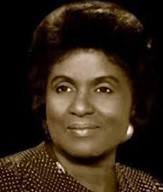 Lena Mae (née Johnson) McLin
Lena Mae (née Johnson) McLin
(b. 5 September 1929, Atlanta, Georgia)
Georgia) was raised in the home of her uncle, Gospel music great Thomas A. Dorsey, whose choir she accompanied. After receiving her bachelor’s degree in music from Spelman College and master’s from the American Conservatory of Music, McLin taught music in the Chicago public school system. She instructed several students who went on to professional careers in Classical and popular music. A choral director, lecturer, author and ordained minister, McLin is also credited as a composer of over 400 choral and solo vocal works, as well as instrumental and electronic compositions.
Audio Recordings Include: Mark Rucker. Mark Rucker Sings Lena McLin: Songs for Voice & Piano. Kjos Music Press KCD8, 2002, compact disc; Sims, Robert. Soul of a Singer: Robert Sims Sings: African-American Folk Songs. Canti Records 9801, 1998?, compact disc.
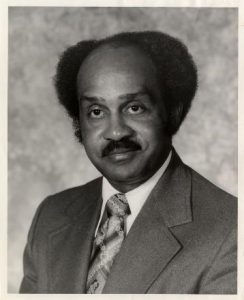
Wendell Phillips Whalum, Sr.
(b. 4 September 1931, Memphis, Tennessee; d. Atlanta, Georgia, 9 June 1987)
Wendell Whalum was a musically active youth performing at churches in Memphis. Whalum matriculated to Morehouse College and Columbia University, finishing his doctoral study at the University of Iowa. He taught at Morehouse for over 40 years and directed its choir to international acclaim. Also known for his skills as an instructor, organist, and musicologist, he composed numerous works for chorus and solo voice.
Whalum, along with composers Betty Jackson King and Roland Carter, each contributed two Spiritual settings to God Is a God. Carter stated that there is no clear order to the placement of the pieces, leaving their organization to the performer’s discretion.
Audio Recordings Include: Anthony Brown. Toil and Triumph: African American Spirituals. Spirituals Project, 2002, compact disc.
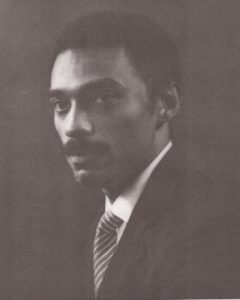 John Daniels Carter
John Daniels Carter
(b. St. Louis, Missouri, 19 April 1932; d. 24 July 1981, Hempstead, New York)
John Carter served as composer-in-residence with the National Symphony Orchestra (Washington, DC) in 1968 and was an instructor at Federal City College, Washington, in the 1970s. He published Cantata in 1964 for soprano Leontyne Price. After a short instrumental prelude, he used four Negro spirituals—“Peter Go Ring Dem Bells,” “Sometimes I Feel Like a Motherless Child,” “Let Us Break Bread Together,” and “Ride On, King Jesus”—as melodic source material for the individual sections of the work.
Audio Recordings Include: Christine Brewer. Songs by Wagner, Wolf, Britten and John Carter. Wigmore Hall Live WHLive0022, 2008, compact disc; Ray Wade. Sence You Went Away. Albany Records TROY 388, 1998, compact disc.
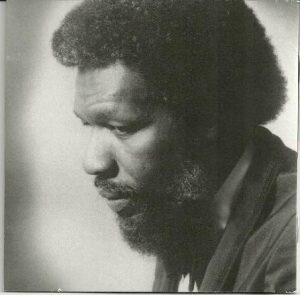 Coleridge-Taylor Perkinson
Coleridge-Taylor Perkinson
(b. 14 June 1932, New York, New York; d. 9 March 2004, Chicago, Illinois)
Coleridge-Taylor Perkinson came from a musical family background and attended New York’s High School of Music and Art and New York University. After receiving his bachelor’s and master’s degrees from the Manhattan School of Music, he accepted positions as an instructor at Brooklyn
College and as conductor of the Brooklyn Community Symphony Orchestra while continuing his musical studies in orchestral conducting at the Salzburg Mozarteum. Perkinson’s professional career reflected his musical stylistic range, spanning the Classical, Blues, and Jazz worlds as a pianist, conductor, arranger and composer–including ballet and film musical scores–for instrumental and vocal solos and ensembles.
Audio Recordings Include: George Shirley. The New Negro Spiritual. W. C. Patterson, 2002, score with compact disc.
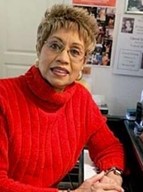 Jacqueline Butler Hairston
Jacqueline Butler Hairston
(b. 18 December 1938, Charlotte, North Carolina)
Jacqueline Hairston is a composer, educator, choral director and pianist who studied at Julliard, Howard University, and Columbia University. Sharing an interest in the heritage of African American folk music with her cousin, composer Jester Hairston (1901-2000), she has used spirituals to compose songs that have been performed and recorded by professional choral and solo vocal performers. Two of Hairston’s concert spirituals, “This Little Light of Mine” and “Guide My Feet,” are included in the Willis Patterson score compilation, The New Negro Spiritual.
Audio Recordings Include: Kenneth Overton. Been in de Storm So Long: Songs My Fathers Taught Me. American Spiritual Ensemble, 2012, compact disc; Robert Sims. In the Spirit: Spirituals and American Songs with Orchestra and Chorus. Canti Classics, 2009, compact disc; William Warfield, Benjamin Matthews, Robert Sims. Three Generations Live. Canti Records, 2000, compact disc; Kathleen Battle. Angels’ Glory. Sony Classical SK 62723, 1996, compact disc; Louise Toppin. Ah! Love But a Day. Albany Records/Videmus TROY 385, 2000, compact disc; Darryl Taylor. How Sweet the Sound. Albany TROY1244, 2011, compact disc.
 Robert Leigh Morris
Robert Leigh Morris
(b. Chicago, Illinois, 22 April 1941)
Robert L. Morris received his bachelor’s degree from DePaul University in Chicago, with graduate studies at Indiana University, Bloomington, and The University of Iowa, Iowa City. He served as choral director at Hampton University, Virginia, Winston-Salem State University in North Carolina, and at Jackson State University in Mississippi before accepting his current post as Director of Choral Activities for Macalester College, St. Paul, Minnesota. Choral arranger for Edward “Duke” Ellington and founder of the Leigh Morris Chorale, Morris has also composed numerous works for mixed chorus, most of which use Afrocentric folk themes. His Lyric Suite: A Collection of Spirituals in Gospel Style, was written in 1970 and published in 2000.
Audio Recordings Include: Louise Toppin. Heart on the Wall: African American Art Songs for Orchestra. Albany Records TROY1314, 2011, compact disc.
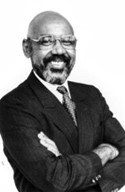 Roland Marvin Carter
Roland Marvin Carter
(b. 4 May 1942, Chattanooga, Tennessee)
Roland Carter studied music at Hampton University, New York University, the Catholic University of America and the Aspen Choral Institute. His career as an educator includes his current professorial position at the University of Tennessee at Chattanooga. He has focused on the preservation of the Negro spiritual both as a composer of choral and solo works and as an accompanist and choral director. He served a six-year term as president of the National Association of Negro Musicians.
Carter, along with composers Wendell Whalum and Betty Jackson King, each contributed two concert spirituals to God Is a God. Carter stated that there is no clear order to the placement of the pieces, leaving their organization to the performer’s discretion.
Audio Recordings Include: Gail Oturo-Robinson. Sweetest Sound I Ever Heard: Spirituals for Solo Voice and Piano, vol. 1. CD Baby, 2020, streaming audio.
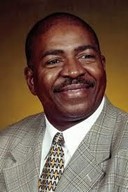 Uzee Brown, Jr.
Uzee Brown, Jr.
(b. 14 November 1942, Cowpens, South Carolina)
Uzee Brown studied at Morehouse College, received his master’s degree in composition from Bowling Green State University, with a second master’s and his doctoral degree in performance at the University of Michigan. Brown developed a career as an operatic and concert vocalist, researcher and educator, serving as chair of the Music Department at Morehouse. He was also president of the National Association of Negro Musicians.
Brown’s first eight-spirituals collection, O Redeemed!, was published in 1994 and recorded on the CD, Great Day! Spirituals, in 2005.
Audio Recordings Include: Uzee Brown, Jr. Great Day! Allgood, 2005, compact disc.
Post-War Baby Boomers and Beyond
The composers who have flourished in the decades since the conclusion of the Second World War have seen the ongoing struggles for civil and human rights and the technological and cultural shifts that have occurred at nearly warp speed. Their music, including spirituals, is often interwoven with the strains of popular music–such as Gospel and Hip Hop–even as they return to an exploration of the roots of this American folk music.
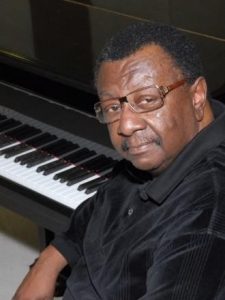 Charles Lloyd, Jr.
Charles Lloyd, Jr.
(b. 22 September 1948, Toledo, Ohio)
Charles Lloyd received his Bachelor of Science in music education from Norfolk State University and Master of Music from the University of Michigan. Since he was first exposed to spirituals during his studies at Norfolk State– with further study of spirituals encouraged by Michigan’s voice department chair, Willis Patterson, Lloyd has composed songs for solo voice and for chorus as well as operatic and instrumental works. He joined the music faculty at the Southern University in Baton Rouge and has been active as a piano accompanist.
A number of Lloyd’s works have been recorded but not credited to the composer. However, his compilation, The Spiritual Art Song Collection, with accompanying compact disc, was published by Warner Bros. in 2000. In a 2010 interview, Lloyd talked about his approach to composing spirituals: “I did not take composition classes or anything like that; my understanding was based on the spirituals. Those medieval modes, church modes tend to slip into the spirituals. You know spirituals make use of the Dorian mode, and sometimes the Lydian and Mixolydian modes… and the blues tones, flatted fifth, and when you mess around with the thirds, and sevenths… and I think that has become my style.”
Audio Recordings Include: Charles Hobson. The Spiritual Art Song Collection. Warner Bros. SVBM00004, 2000, compact disc.
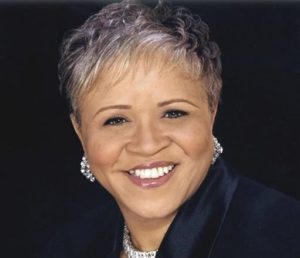 Evelyn Simpson-Curenton
Evelyn Simpson-Curenton
(b. 1953, Philadelphia, Pennsylvania)
Evelyn Simpson-Curenton was born into a professional musical family. After beginning her piano studies at an early age, she attended Temple University, completing her undergraduate degree in music education and voice. She has been active as an educator, pianist, organist, and composer of music for a variety of music entities.
Simpson-Curenton was a commissioned participant in the Negro spirituals concert, featuring sopranos Kathleen Battleand Jessye Norman, at Carnegie Hall. Simpson-Curenton’s “Oh, Glory,” was set for soprano (Battle), flute and harp.
Audio Recordings Include: Jessye Norman. Spirituals in Concert. Deutsche Grammophon 429 790-2, 1991, compact disc.
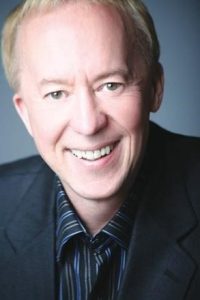 Mark Hayes
Mark Hayes
(b. 28 March 1953, Ladysmith, Wisconsin)
Mark Hayes holds a Bachelor of Music degree in piano performance from Baylor University. While his professional musical career has focused on choral composition and conducting, as well as piano concertizing, Hayes has composed and published works for various instrumental forces and for solo voices. His works reflect influences from sacred and secular musical styles, from Gospel and Jazz to Folk and Classical.
Hayes published the compilations, 10 Spirituals for Solo Voice: For Concerts, Contests, Recitals, and Worship, volume one (1998) and volume two (2006) with medium high and medium low editions.
Audio Recordings Include: Indra Thomas. Great Day: Indra Thomas Sings Spirituals. Delos DE 3427, 2012, compact disc. Lima, Philip. Songs of a Wayfarer. Private label, 2017, streaming audio.
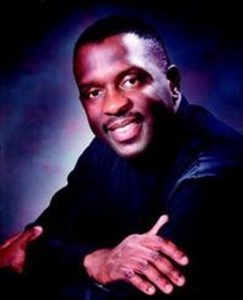 Moses George Hogan
Moses George Hogan
(b. 13 March 1957, New Orleans, Louisiana; d. 11 February 2003, New Orleans, Louisiana)
Moses Hogan graduated from the New Orleans Center for Creative Arts and the Oberlin Conservatory of Music. Known first as a concert pianist, Hogan began organizing choral groups and composing works for chorus and for solo voice.
He was editor of the collection, Oxford Book of Spirituals, which was published in 2001, and he published The Deep River Collection: Ten Spirituals Arranged for Solo Voice and Piano—with high and low voice editions—in 2000.
Audio Recordings Include: Moses Hogan. Give Me Jesus. EMI Classics 7243 5 56788 2 9, 1998, compact disc; Derek Lee Ragin. Negro Spirituals. Virgin Classics 0946 363305 2 5, 2006, compact disc.
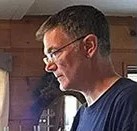 Victor Kris Labenske
Victor Kris Labenske
(b. 26 December 1963, Jonesboro, Arkansas)
Victor Labenske is a pianist, educator, and composer who studied piano performance at Point Loma Nazarene University (BA), University of Missouri-Kansas City (MM) and the University of Southern California (DMA). In addition to serving on the music faculty at Point Nazarene for more than 30 years, he is credited as a composer of over 500 works for piano and other instrumental or vocal forces.
Labenske published Concert Hall Spirituals: Settings for Piano and Voice, his setting of ten spirituals, including “Give Me Jesus,” in 1999.
Damien LeChateau Sneed
(b. 30 January 1977, Augusta, Georgia)
Damien Sneed is a multi-faceted musician whose abilities have expressed themselves since he began piano study at age three. He received his bachelor’s in piano performance from Howard University, master’s in music technology from New York University, with additional study at Peabody Conservatory and the Manhattan School of Music. He has served as accompanist for numerous professional Classical and Jazz performers as well as performing as a piano soloist. In addition to his roles as educator, music producer, and choral director, he has composed, arranged and orchestrated music for a variety of musical forces.
Sneed collaborated with tenor Lawrence Brownlee on Spiritual Sketches, a recording of Sneed’s concert spirituals, which was published in 2013.
Audio Recordings Include: Lawrence Brownlee. Spiritual Sketches. LeChateau Earl Records 888174029597, 2013, compact disc.
Shawn Ehireime Okpebholo
(b. 28 March 1981, Lexington, Kentucky)
Shawn Okpebholo completed his undergraduate studies in composition and music history from Asbury College, and he earned his master’s and doctoral degrees in composition and theory from the University of Cincinnati, College-Conservatory of Music. In addition to his burgeoning career as a composer of vocal and instrumental music, he currently teaches music composition and theory at Wheaton College Conservatory of Music.
A composer of a wide range of instrumental and vocal works, Okpebholo published many of his concert spirituals in the 2013 collection, Steal Away, with a follow-up compact disc featuring baritone Will Liverman and mezzo-soprano J’nai Bridges released in 2014.
Audio Recordings Include: Will Liverman. Lord How Come Me Here? Navona Records NV6408, 2022, compact disc, streaming audio.
Final Thoughts
In the first century of the concert spiritual, composers have taken the folk songs of slaves and used them as source material for dynamic songs that challenge the singer’s technical and interpretive abilities. As the singer explores this music, the singer has the opportunity to discover the extensive range of options available to them for programming a section of a recital or even an entire program of spirituals that can be emotionally and intellectually satisfying to the performers and the audience.
As for recommendations, I suggest four compilations that cover a variety of performers and composers presenting an extensive range of concert spirituals over the years. The first is Negro Spirituals: The Concert Tradition, 1909-1948, a 1999 release by Frémeaux & Associés. Selections on the compact discs are performed by sopranos Ellabelle Davis and Maynor, contraltos Anderson and Evelyn Dove, tenors Jules Bledsoe and Hayes, baritone John Payne, and bass-baritone Robeson. The composers represented include Lawrence Brown, Burleigh, Hayes, John C. Payne, R. P. Parham, and Robert Nathaniel Dett.
Second is Negro Spirituals, released by EMI Classics is 1998. The compact discs consist of selections by sopranos Martina Arroyo, Kathleen Battle, and Barbara Hendricks; mezzo-soprano
Florence Quivar, and contralto Anderson, variously with chorus and/or piano. The songs are by Dett, Burleigh, William Lawrence, Leonard dePaur, William Dawson, Robert Sadin, Hall Johnson, James Miller, Margaret Bonds, Edward Boatner, Roland Hayes, Howard Johnson, and Robert MacGimsey.
The third recording is Watch and Pray: Spirituals and Art Songs by African-American Women Composers, which was released by Koch International Classics in 1994. The selections were performed by mezzo-soprano Pamela Dillard, contralto Ruth Hamilton, and baritone Robert Honeysucker, all accompanied by piano. The songs are by Bonds, Undine Smith Moore, Florence Price, Julia Perry, Betty Jackson King.
The last compilation is one of the most popular recordings of spirituals released. This is the 1991 Spirituals in Concert, recorded during a live concert featuring sopranos Kathleen Battle and Jessye Norman, who are variously supported by orchestra, organ, chorus, flute, harp, and piano.
The composers represented were Charles Lloyd, Jr., Don Marsh, Sylvia Olden Lee, Hall Johnson, Evelyn Simpson-Curenton, Thomas Kerr, Jr., William L. Dawson, Hale Smith, Kurt Kaiser, and Bonds.
1 Shawn E. Okpebholo, Steal Away, (Wheaton, Illinois?: Yellow Einstein Records, 2014): <ii>.
2 Eva Jessye, My Spirituals. (New York: Robbins-Engel, 1927): 5.

